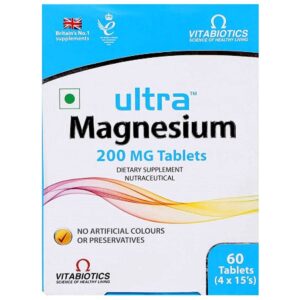DIETARY SUPPLEMENT + MAGNESIUM AND + NUTRACEUTICAL DIETARY
Dietary Supplement: Dietary supplements are products that contain vitamins, minerals, herbs, or other dietary ingredients intended to supplement the diet. They are commonly used to ensure adequate nutrient intake, promote overall health, and address specific health concerns.
The mechanism of action of dietary supplements varies depending on their ingredients. For example, vitamins and minerals are essential for normal bodily functions and metabolism, while herbs and other botanicals may have various bioactive compounds that interact with different systems in the body.
The recommended dose of a dietary supplement depends on the specific product and its ingredients. It is crucial to follow the instructions on the product label or consult a healthcare professional for appropriate dosing information.
Side effects of dietary supplements can also vary depending on their ingredients. In general, most dietary supplements are considered safe when used as directed. However, some individuals may experience adverse effects, especially when taken in excessive amounts. Common side effects may include gastrointestinal symptoms such as nausea, diarrhea, and stomach cramps. Additionally, some supplements may interact with medications or have other contraindications, so it is important to consult a healthcare professional before starting any new dietary supplement.
It is essential to note that dietary supplements are not intended to replace a balanced diet or serve as a substitute for medication. They should be used judiciously and under the guidance of a healthcare professional to ensure safety and effectiveness.
Magnesium And: Magnesium And is a magnesium supplement that is commonly used to treat magnesium deficiencies in the body. It is available in oral tablet form and comes in different strengths, typically ranging from 150 mg to 500 mg.
Magnesium And works by providing the body with an essential mineral, magnesium, which is involved in various biochemical reactions and plays a crucial role in maintaining overall health. It is necessary for many enzymatic reactions, energy metabolism, nerve function, muscle contraction, and maintenance of normal heart rhythm.
The recommended dose of Magnesium And depends on the individual’s age, sex, and specific medical condition. Generally, the typical dose ranges from 200 mg to 400 mg daily. It is important to follow the instructions provided by the healthcare professional or read the product label for specific dosing information.
Most individuals tolerate Magnesium And well, and side effects are usually mild and rare. However, some possible side effects may include diarrhea, stomach upset, nausea, and abdominal cramping. These side effects are generally dose-dependent and can be minimized by starting with a lower dose and gradually increasing it.
It is important to note that while Magnesium And is generally safe for most individuals, it may interact with certain medications. It is advisable to consult with a healthcare professional before starting any new medications or supplements, especially if the individual has any underlying medical conditions or is taking other prescription drugs.
In summary, Magnesium And is a magnesium supplement used to treat magnesium deficiencies in the body. It works by providing the necessary magnesium for various physiological functions. The dose and side effects may vary depending on the individual, and it is recommended to consult with a healthcare professional before starting this supplement.
Nutraceutical Dietary: The term “Nutraceutical Dietary” seems to be an umbrella term referring to dietary supplements or functional foods that offer health benefits beyond basic nutrition. As it encompasses a wide range of products, there is no specific drug or chemical compound called “Nutraceutical Dietary.” However, I can provide you with general information about nutraceuticals.
Nutraceuticals are often derived from natural sources and can include vitamins, minerals, herbal extracts, probiotics, and other dietary components. They are usually taken orally and are intended to support health, enhance well-being, or prevent or treat specific conditions.
The mechanism of action for nutraceuticals varies depending on the specific product. For example, vitamins and minerals may act as cofactors in vital biochemical reactions, while herbal extracts may exert their effects through various mechanisms such as antioxidant activity, modulation of enzyme activity, or influencing cellular signaling pathways. Probiotics, on the other hand, introduce beneficial bacteria into the gut microbiome, helping to maintain a balanced and healthy gut environment.
The appropriate dose for nutraceuticals depends on the specific product and the intended use. It is important to follow the instructions and recommended dosage provided on the product packaging or by a healthcare professional to ensure safety and effectiveness.
Side effects associated with nutraceuticals can be minimal due to their natural origins, but they may still occur. These side effects can vary depending on the specific nutraceutical and individual sensitivities. Some potential side effects may include gastrointestinal disturbances (such as bloating, diarrhea, or constipation), allergic reactions, interactions with medications, or rare cases of toxicity if taken in excessive amounts.
It is crucial to consult with a healthcare professional before starting any nutraceutical product, especially if you have underlying health conditions, are taking medications, or are pregnant or breastfeeding. They can provide personalized advice and guidance based on your specific needs and circumstances.

